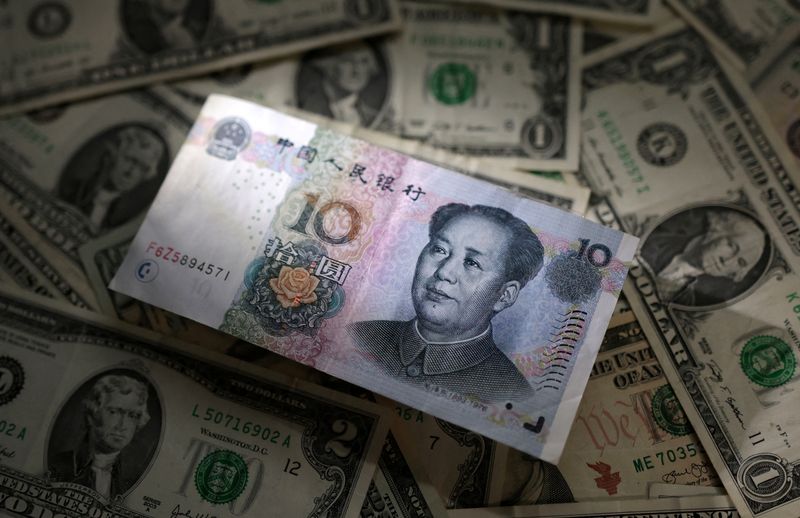By Samuel Shen and Rae Wee
SHANGHAI/SINGAPORE (Reuters) - Global companies are making a beeline for China's debt markets, issuing record amounts of yuan-denominated bonds and borrowing heavily from mainland banks, capitalising on rock-bottom yuan interest rates as funding costs elsewhere jump.
Companies and banks are raising record amounts of cash through yuan bonds issued in mainland China and in Hong Kong, known as panda and dim sum bonds, respectively.
The surge in their borrowing from Chinese banks has catapulted the yuan past the euro into becoming the second-biggest currency used in global trade finance, providing a fillip to Beijing's ambitions to internationalize the yuan.
The global rush to borrow from China is counterintuitive, coming as international investors are shunning the world's second-biggest economy out of concerns about geopolitical tensions and weak growth, says Fiona Lim, senior FX strategist at Maybank.
"While the fundamental story is not compelling for Chinese investors looking for growth, the depreciation of the yuan as well as the rate cuts result in a much cheaper cost of borrowing," Lim said.
Foreign companies such as German carmaker BMW (ETR:BMWG) and Crédit Agricole S.A as well as overseas units of Chinese firms raised a record 125.5 billion yuan ($17.33 billion) selling panda bonds during the January-October period, a 61% jump from the same period last year.
The National Bank of Canada (OTC:NTIOF) raised 1 billion yuan from the sale of a three-year panda bond at a coupon of 3.2% late last month, a bargain compared to rates of 4.5% at home.
The issuance of dim sum bonds in Hong Kong also hit a record high, surging 62% from a year ago to 343 billion yuan during the first eight months. Issuance of yuan-denominated loans in the city also soared.
For China, the growing share of yuan in global financing ticks one of its main internationalisation priorities, though the recent burst of activity appears to have been overwhelmingly for domestic use.
"Panda bonds are steadily promoting the renminbi's function as a funding currency", the People's Bank of China (PBOC) said a report last month. It has been motivating banks to lend to offshore firms and allowed broader use of yuan outside China.
The yuan's share as a global currency in trade finance jumped to 5.8% in September from 3.91% at the start of the year, trumping the euro for the first time, according to SWIFT. The international payments system dominates the traffic of letters of credit - a form of short-term financing that facilitates trade.
Regardless, it barely scrapes the dollar's dominance at 84.2%.
Several gauges of yuan internationalisation -- including a Standard Chartered (OTC:SCBFF) Bank tracker measuring the global use of the yuan, and Bank of China's Cross-border RMB Index (CRI) -- all hit record highs this year.
TOO EARLY TO CELEBRATE
However, analysts point to the limited use and circulation of international yuan bond proceeds so far, and say it’s premature to trumpet internationalisation.
German automaker Volkswagen (ETR:VOWG_p) Group told Reuters it will use its inaugural 1.5 billion yuan panda bond proceeds only for its onshore China business.
The Mercedes-Benz (OTC:MBGAF) Group also plans to use its panda bond proceeds to support a car leasing business in China.
Yuan internationalisation "isn't going as well as the headline figures might suggest," said Mark Williams, chief Asia economist at Capital Economics.
"It's still the case that more than half of cross-border transactions using the yuan are between the mainland and Hong Kong. This is a very local form of internationalisation."
Maybank's Lim concurs. "We should be discerning of the cross-border transactions that are between China and Hong Kong versus China and the rest of the world."
Within trade finance and payments, the yuan's use is largely limited to developing countries friendly to China, such as those joining its Belt and Road initiative.
"There has been a surge in use of the yuan to settle trade, but only within specific bilateral channels: countries like Russia, Argentina, Pakistan and Nigeria," Williams said.
Countries that are geopolitically aligned with the U.S. "are showing no willingness to switch over to using the yuan. That suggests that global use of the yuan in trade will hit a low ceiling."
($1 = 7.2421 Chinese yuan renminbi)
